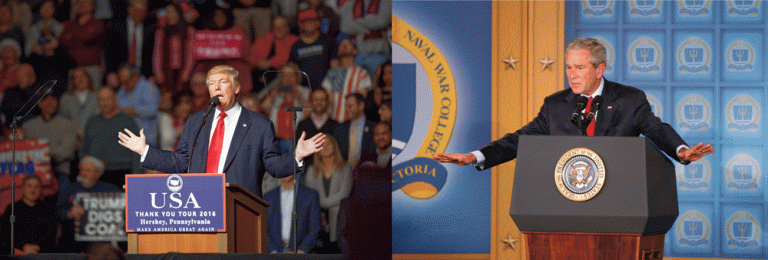
Walker Laughlin
Last Monday, NBC’s “Today” show invited someone who many thought — or hoped — would stay hidden under the obscurity of post-presidential status. George W. Bush broke the years of silence he held under the Obama Administration to denounce President Donald Trump’s ongoing war with the media, calling a free press “indispensable to democracy” as he promoted his book of portraits of United States veterans. Leave it to Dubya to tell the current president that it’s okay to be made fun of.
Before “alternative facts” and “fake news,” there was, “Is our children learning?” and, “They misunderestimated me.” A needless war in Iraq took thousands of lives, American or otherwise, as 45 million languished without health insurance back in the deficit-ridden states. To many, Bush became a leader synonymous with failure, ending his presidency with an approval rating of 22 percent. Media outlets — now “indispensable” — took special delight in the Texan’s political tumbles.
But for all of his failings, Bush cannot be called a master of deflection. The subject of his current art project shows (we can hope) some remorse for one of America’s costlier foreign policy mistakes. Indeed, in 2008 he admitted to ABC that, “The biggest regret of all the presidency has to have been the intelligence failure in Iraq.”
While this does place more blame on the intelligence operations leading up to the war than his decision to send in the troops, it stands far apart from the words of a man who told millions of Americans in a presidential debate that he had condemned the Iraq War all along, despite well-documented tapes to the contrary. On November 8th that man became the new commander-in-chief.
In only one month, it’s been made clear that Donald Trump will hold a special place in the annals of America’s most despised leaders. His reckless travel ban, swampish cabinet picks, and shadowy ties to Russia predict failures ranging from an economic crisis to a modern-day Watergate, to worse.
The threat of executive mistake (moral and practical) is nothing new. Trump’s utter disregard for his role as public servant is. In the same tone as his incendiary campaign, he continues to challenge his country’s most sacred institutions. From this man’s worldview, elections are “rigged” when he can lose them, the courts are “political” when they defy him, and the media is “the enemy of the people.” Are these not the words of a wannabe dictator? A Putin with a shirt on?
Time will tell whether President Trump surpasses the legacy of his ill-fated predecessor, but by the metric of tainting the office of the United States presidency, he already has.
That solemn reality forms a unique political crisis that demands alternative voices like Bush. Republicans are posed to hold majorities in every branch of the federal government and appear willing to concede to their brash executive, if only for the sake of power. Bush, who did not vote in the 2016 election, joins a minority of GOP dissidents, including Senators John McCain and Lindsey Graham, who together offer what have become maverick positions: Trump’s communications with Russian diplomats during the campaign might best be investigated by a neutral body, or the media might offer a welcome check on a president whose sense of reality conforms largely to his sense of self.
Such claims might seem self-evident, though apparently they are not to the majority of the House and Senate. The few that do hold up these principles accomplish two vital tasks. They offer dispute from a branch designed in part to check executives but that has transformed, in recent years, into only another component of a broader team — red or blue. Secondly, the few that speak out from within his own party affirm that this president is far from normal.
That is not to say that Bush has become America’s hero. One appearance on NBC will not erase the failures of the Iraq War or No Child Left Behind. However, in his dissent, Bush announces something significant. The ex-president, more than many of his peers, understands that this dark moment may come to define the history of a fragile democracy. And this time he wants to be on the right side of it.










